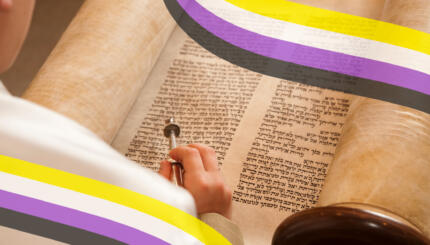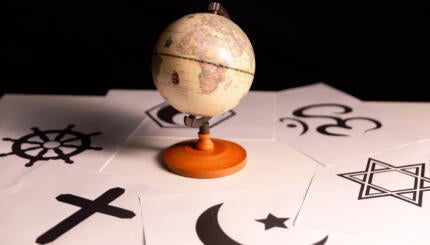Many synagogues in the Reform movement are currently struggling to resolve questions surrounding the role of the non-Jew in ritual participation. Rabbi Eric Yoffie–president of the Union of American Hebrew Congregations, the Reform umbrella group–wrote in the fall 1999 issue of Reform Judaism, “We all understand that those who have not converted cannot participate in certain rituals.” The issue comes to a head when non-Jewish parents wish to have an aliyah, to be called up to the Torah, at their child’s bar or bat mitzvah.
At the Reform movement’s December 1999 biennial convention in Orlando, the vast majority of rabbis asked about this issue were categorically opposed to allowing non-Jews to have an aliyah. How could a non-Jew recite a prayer that thanks God for choosing “us” and giving “us” the Torah? How could a non-Jew have the highest honor that a Jew can have, being called to the Torah?
There’s a simple answer: an intermarried non-Jew who has participated in raising a child as a Jew to the point of that child becoming bar or bat mitzvah could say, with complete integrity and authenticity, that his or her family is included among the “us” who were chosen and to whom the Torah was given. Moreover, such a parent arguably deserves the highest honor that the Jewish community can bestow. What can be harder for a parent to do than to give a child permission to have an identity different from that parent? Given the sacrifices involved, honor is exactly what these parents deserve.
Telling a non-Jewish parent that he or she cannot have an aliyah because he or she isn’t included in the “us” is destructive and counterproductive. Telling them that it’s fine for them to say the prayers in the pews, but not to go up on the bimah (pulpit) and receive an honor for Jews, is not logical or convincing. They are left questioning whether they can authentically say all of the many Jewish prayers that refer to “us.”
With your help, My Jewish Learning can provide endless opportunities for learning, connection and discovery.
Intermarried non-Jews want to be accepted as they are. They want to be comfortable in the synagogue. They want to feel united with their Jewish spouse, not divided, not unequal. They don’t want the message given to the bar or bat mitzvah child at this critical life-cycle event to be that one of their parents isn’t allowed to participate and be honored fully.
Instead of encouraging such people to live Jewishly, maintaining the boundary that only a Jew can have an aliyah makes them feel excluded. “We are here because we thought we could pray together as a family. To say that my silence is mandated–even at the single moment of the aliyah–strikes at the reason that we are here.”
“I would feel put out if I was told, no matter how committed I was, that I couldn’t participate fully. Do you mean to tell me that my Jewish brother-in-law, who is totally secular and whose only connection to Judaism is to have matzah ball soup at the seder at my house, could have an aliyah at my son’s bar mitzvah, and I couldn’t?”
“I feel I’ve made a huge commitment in raising our children as Jews. Differentiation would feel punitive and exclusive. People need to understand what it would be like for the non-Jewish parent to be excluded at this moment despite all of the sacrifices he or she had made.”
The movements are stuck on their policies that maintain boundaries, because their concept of Jewish peoplehood excludes unconverted non-Jewish spouses. But that concept could be broadened so as to include them.
Non-Jews have always had a recognized place within the Jewish community. We could start thinking of the Jewish people as a broader Jewish community, made up of both Jews and their non-Jewish partners. The theoretical foundation for that concept lies in the Torah itself, which refers to them as gerim toshavim, “strangers in your camp,” or, in Everett Fox’s translation, “sojourners who sojourn with you.”
Indeed, the Yom Kippur morning Torah portion in the Reform liturgy suggests that the sojourners were included among the people who entered into God’s covenant, “You stand this day, all of you, before your Eternal God… every one in Israel, men, women, and children, and the sojourners who sojourn among you… to enter into the sworn covenant which your Eternal God makes with you this day, in order to establish you henceforth as [a] people…” (Deuteronomy 29:9-12). Elsewhere the Torah refers to kol adat b’nai yisrael, “the entire community of the children of Israel” (Leviticus 19:2).
The American Jewish community needs a religious movement that would allow intermarried and unconverted non-Jews to chose complete participation in Jewish life. In such a movement, the Jewish people would mean a broader Jewish community made up of both Jews and the sojourners among us. Jews and sojourners could feel that Judaism is their religion, and that “member of the Jewish community” is their identity. This policy of “total inclusion” would eliminate the feelings of being different, and excluded, that inhibit their Jewish living and child raising. Instead, they would be encouraged and supported in their own Jewish living and their efforts to raise their children as Jews.
Reprinted with permission from InterfaithFamily.com.
aliyah
Pronounced: a-LEE-yuh for synagogue use, ah-lee-YAH for immigration to Israel, Origin: Hebrew, literally, "to go up." This can mean the honor of saying a blessing before and after the Torah reading during a worship service, or immigrating to Israel.
bat mitzvah
Pronounced: baht MITZ-vuh, also bahs MITZ-vuh and baht meetz-VAH, Origin: Hebrew, Jewish rite of passage for a girl, observed at age 12 or 13.
bimah
Pronounced: BEE-muh, Origin: Hebrew, literally "stage," this is the raised platform in a synagogue from which services are led and the the Torah is read.
mitzvah
Pronounced: MITZ-vuh or meetz-VAH, Origin: Hebrew, commandment, also used to mean good deed.
seder
Pronounced: SAY-der, Origin: Hebrew, literally "order"; usually used to describe the ceremonial meal and telling of the Passover story on the first two nights of Passover. (In Israel, Jews have a seder only on the first night of Passover.)
Torah
Pronunced: TORE-uh, Origin: Hebrew, the Five Books of Moses.
Yom Kippur
Pronounced: yohm KIPP-er, also yohm kee-PORE, Origin: Hebrew, The Day of Atonement, the holiest day on the Jewish calendar and, with Rosh Hashanah, one of the High Holidays.


